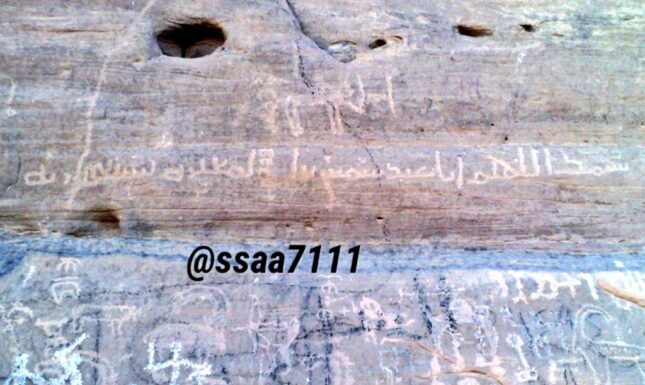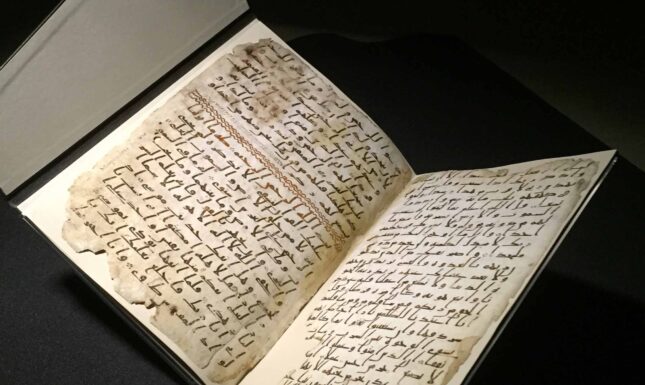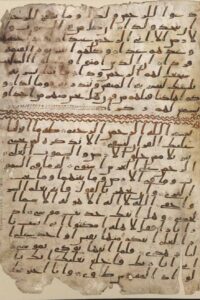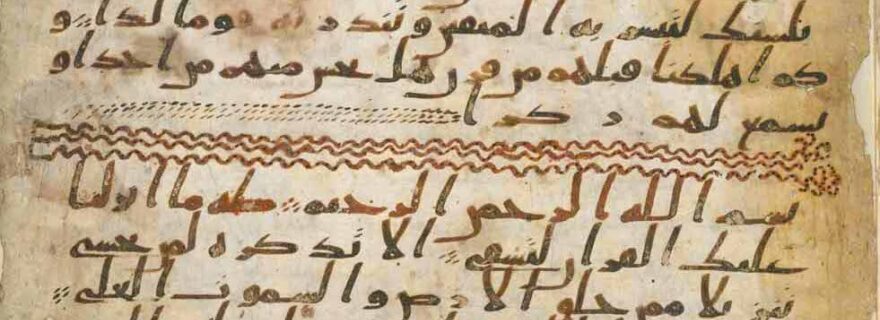Arabian Monotheism before Islam: Some Reflections on the Pagans of the Qurʾan
The religious and philosophical landscape in Arabia before the advent of Islam remains, for the most part, uncharted territory. This post sheds light on how the new Islamic dispensation of the seventh century AD came to see the Arabian pagans and their worldview.
Monotheism before Islam
A few years ago, the Saudi inscriptions’ enthusiast Twitter account nawādir al-āthār wa l-nuqūsh posted an image of recently discovered inscription, that reads:
بسمك اللهم أنا عبد شمس بن المغيرة يستغفر ربه
“In your name, O Allāh, I am ʿAbd-Shams, son of al-Mughīrah, seeking the forgiveness of his Lord”


The inscription appears to belong to the Paleo-Arabic category that brackets Arabic inscriptions from the late fifth century CE and possibly surviving into the early Islamic period. The categorical neologism was first coined by Christian Robin, ʿAlī al-Ghabbān, and Saʿīd al-Saʿīd.
There are two main giveaways in the text that allows us to date the inscription to the period before Islam. First, the appellation of ʿAbd-Shams is pre-Islamic and appears to point to the astral worship practices of Arabs in the epochs before the rise of Islam. Indeed, if the sources are to be believed, some of the Arabs before Islam worshipped the sun (shams) and other heavenly bodies. We read that the shams was honoured and afforded a sanctuary by some Arabian tribes. While the ʿabd-Shams described the worshipper of the sun, other related appellations related to the sun included ʿabd-shāriq (worshipper of the rising sun) and ʿabd-muḥarriq (worshipper of the burning sun).
Astral worship among the ancient Arabs is attested in Qurʾan 53.49 where there is a reference to Sirius or shiʿrā, colloquially known as the Dog Star which sits in the Canis Major constellation in the southern celestial hemisphere ('And He alone is the Lord of Sirius.')
Second, in a recent article al-Jallad and Sidky have argued that the inscription is monotheistic and datable to the pre-Islamic Arabian monotheistic variety whose worldview and monotheistic commitment bears the imprint of a non-Rabbinic form of Judaism.
Ancient monotheism in the Qur'an
The presence of Arabian monotheisms inflected by a yet to be fully determined form of late antique Judaism is unchartered territory in the studies of Islamic origins. In my current project on monotheism and paganism in the Qurʾan, I explore the religious worldview of the so-called pagans or mushrikūn
who appear in the Qurʾan as the Prophet Muḥammad’s main interlocutors and religious rivals in the Ḥijāz. My preliminary findings have led me to believe that there were indeed a variety of Arabian paganisms on the eve of Islam, around the late fifth and early sixth century CE. The so-called pagans of the Ḥijāz, like ʿAbd-Shams, son of al-Mughīrah, are a far cry from the uncouth and theologically illiterate idol-worshippers portrayed in the Islamic tradition to represent seventh-century Meccans before the advent of Islam. True, idol-worship is explicitly mentioned and condemned in the quranic diction of monotheism; however, the references appear to speak of the distant biblical pasts, with one possible exception in Qurʾan 4.50.
The late Patricia Crone called attention to this little-explored aspect of Islamic origins when she said,
"…there is something completely amiss. The Qurʾan never as much as hints at the existence of idols in the Abrahamic sanctuary; it never mentions Hubal; with the possible exception of 4.50, relating to Medina, it never mentions any pagan religious personnel; it never mentions pagan shrines or other pagan objects among the Messenger’s contemporaries, not does it threaten destruction of such things or tell of their destruction after the Messenger’s victory." [Crone, 2016]
I find this quite fascinating and a worthy line of research to pursue. While the Quran speaks only of a handful of religious communities – for example the Jews, Christians, Sabians(?), and Zoroastrians – it, as matter of fact, tells much more about the other religious groups contemporaneous with Muḥammad, namely the mushrikūn. It gives the reader a great many clues (I have counted over 400 verses) to help understand shirk (polytheism) and mushrikūn (polytheists) who emerge as the chief adversaries of Muḥammad—and perhaps are the most-mentioned theological interlocutors during his career.
Should we speak of the so-called pagans or the mushrikūn as a religious group? Did they belong to a particular religion or religious orientation? This is a difficult question to answer. But it will help a great deal if we consider the ancient context and the epistemic spaces of late antiquity to understand better the conceptual meanings of “religion” (دين).
The Arabic dīn is similar to the Hebrew-Syriac DYN, “to judge”. In Hebrew דן (dān) refers to judgement, while dīn (דין) describes legal religion, or law. Similarly, in Syriac
dīnā is also judgement, while dayyānā is a judge and dēn is religion (though the latter occurs rarely, only in reference to the “religion” of the Persians).
In its quranic usage dīn denotes obligation and submission. Some German orientalists suggested a Middle Persian connection linked to the word den which denotes revelation. However, I am more interested in the semitic etymology which appears closer to the quranic conception of dīn. The semitic meaning of the term dīn could apply to the “pagans” of the Quran in a meaningful way so as to capture and elucidate their religious and philosophical commitments.
Long ago, the Japanese Islamicist Toshihiko Izutsu (d. 1993) stated rather audaciously that the quranic pagan understanding of God was surprisingly close to the Islamic concept. This seems odd at first. The Muslim tradition identify the mushrikūn (مشركون) as pagans, that is, idol-worshippers. Muḥammad identified his God as the God of Moses and Jesus. The God of Abraham and Moses is a deity who revealed Himself to particular people at particular times. So how does this square with the pagan concept of a deity which is anchored in the anthropomorphised notions of God? Was Izutsu wrong?


Originally, “paganism” was used as pejorative term by Christians against the non-Christian Roman religions, as well as the religious peasantry. The Latin paganus defines the countryside, peasants, or rustic settings. The pagans against whom the early Christians polemicised were not necessarily idol-worshippers. They sometimes included what we might now call monotheists (the term monotheism is a seventeenth-century construct), polytheists, henotheists (worship of supreme god while not denying other gods), or kathenotheists (worship of one god at a time).
The pagans of ancient times were indeed misunderstood or misconstrued, and mutatis mutandis so are the pagans of the Qurʾan. The Qurʾan accuses of them of the gravest sin in Islamic theology: shirk (شرك). This in mind, is “paganism” then the most apposite rendering of shirk? I don’t think so. I prefer “associationism”. While the shirk of the quranic associationists earned them the wrath of God and that of Muḥammad, it should be noted that there is a difference between shirk and kufr (disbelief). It is wrong to think of the mushrikūn as disbelievers or infidels. The “pagans” of the Qurʾan accept that Allāh is the God of the Jews and Christians (and of Muḥammad). Moreover, numerous verses in the Muslim sacred text tell us that Muḥammad and his pagan opponents worshipped the same God, the Sovereign God of the Quran.
Rather than accusations of disbelief, it seems that the Qurʾan’s main charge against the mushrikūn is the invention of lies about Allāh, as 18.15 states quite clearly: 'These, our people, have taken besides Him deities. Why do they not bring for [worship of] them a clear authority? And show is more unjust than one who invents about Allah a lie?'
This charge is repeated throughout in Qurʾan 6.21, 7.37, 10.17, 11.18, 29.68, 61.7, for example. What were the lies invented by the mushrikūn? Qurʾan 10.68-69 mentions the main lie:
'They say, ‘God has begotten offspring’ … Say: those who attribute a falsehood to God will never prosper. Say, “Indeed, those who invent falsehood about Allah will not succeed.'
Whatever we make of these verses, one thing is certain: The Qurʾan does not consider the mushrikūn deniers of God nor does it relegate them to disbelief. The mushrikūn are believers in the sense of admitting the existence of God and his role as creator of the heavens and the earth, as we see in Qur'an 39.38:
'And if you asked them , "Who created the heavens and the earth?' they would surely say, "Allah". Say, "Then have you considered what you invoke besides Allah? If Allah intended me harm, are they removers of His harm; or if he intended me mercy, are they withholders of His mercy?" Say, "Sufficient for me is Allah; upon Him [alone] rely the wise reliers."


Believers in God
In Qurʾan 39.38, 31.25, 43.9, for example, the mushrikūn are described as upholders of (i) God’s existence; (ii) believers in God’s creative agency; and (iii) committed to the doctrine that God is the originator of the cosmos. Closely related to the invention of lies that are ascribed to God, the quranic animus towards the mushrikūn is also predicated on their belief in lesser deities beside Allāh. These deities were not always called gods, however.
In Qurʾan 19.81, 21.21, 36.23, 18.15, 36.74, 21.43, 21.22, 17.42, for example, the verses underscore this belief of the mushrikūn as another reason behind the hostility towards them. The Qurʾan is quite specific in stating that the mushrikūn believed in Allāh but — and this is the punchline—they took lesser deities beside Allāh (مع الله).
'Then declare what you are commanded and turn away from the polytheists. Indeed. We are sufficient for you against the mockers. Who make [equal] with Allah another deity. But they are going to know.' [Qur'an 15.94-96]
Does the Qurʾan mention the names or appellations of these lesser deities? “Ask the messengers whom we Sent before you: have We set up gods to be worshipped apart from al-Rahman?” Qurʾan 43.45 says. The names are rarely mentioned, except in a few places, such as Qurʾan 37.125 where Baʿl (بعل ) is identified as one such of the lesser deities. Baʿl (Hebrew: בעל) is an old Semitic term for “master” or “owner.” It was widely used to refer to the “local god” (fertiliser of the soil). In other instances, the Qurʾan names celestial objects taken by mushrikūn as lesser deities beside Allāh (such as the above-mentioned shiʿrā).
It is possible, I believe, to go a few steps farther in order to reconstruct the “religion” or religious outlook of the so-called pagans of the Qurʾan by utilising a number of Late Antique sources. The sources we have at our disposal include Syriac hagiographies, Christian-Pagan polemics, and South Arabian inscriptions, Nabataean, Safaitic, and inscriptions in Ḥimyar between 380 and c. 530 CE. These sources are auxiliary sources and do not necessarily guide my investigation. The primary works I rely on are the sīrah material, early ḥadīth corpora, pre-Islamic poetry, and Arabic antiquarian accounts.
As useful as these early Islamic and non-Islamic source material are, nothing surpasses the Qurʾan in historicity and remarkable accuracy with which it describes the so-called pagans (the mushrikūn). Indeed, the Qurʾan does polemicise against the pagans—and sometimes unfairly. However, the details that emerge from a carefully reconstructed view of the four hundred or so verses offer us the best insight, in my view, into the life of the seventh century Arabian mushrikūn.
Preliminary findings
1. The mushrikūn (which I break into 4 overlapping currents) believed in one Supreme God, in the supernatural, and lesser deities. These lesser deities were considered peers of Allāh (انداد). They had creative powers. Some pagans practised astrolatry. Others ancestral worship. All pagans believed in intercession and conceded to the existence of jinns and demons.
2. The Arabian mushrikūn (or “pagans”) had a crude legal outlook, too. They believed in a measure of ḥalāl and ḥarām, in the sacrosanctity of crops, hallowed food, and adhered to dietary restrictions motivated by their religious commitments.
3. We even find traces of theology-like commitments and arguments, such as belief in determinism, in the probativeness of clear poof and miracles, and in the different modulations of worshipping Allāh. They believed in the doctrine of prophecy as well.
4. Their prayers and rituals were not too dissimilar to religious dispensations of the Late Antique religions. They believed in sacred space, performance of prayer, in ḥajj rituals, in animal/votive sacrifice, in the consecration of first fruits of agriculture, in the slitting of cattle ears, and in the prohibition of some cattle for ploughing. In fact, like many of the Islamic ḥajj rituals, many devotional parts trace back to ancient pre-Islamic times. The talbiyah (تلبية) invocations, marking the moments when the pilgrim enters the state of temporary consecration (احرام), have a pre-Islamic past. The pre-Islamic Meccans read talbiyahs before entering the state of iḥrām in a variety of ways. The practise was probably introduced into the Meccan pilgrimage by Quṣayy b. Kilāb, the religious reformist ancestor of the Prophet Muḥammad.
5. They practiced child-killing as an act of religiosity and made vows and performed prayers for healthy children.
6. The mushrikūn extended their legal behaviour to ancestral pietism and followed the ways of their ancestors, as well as their legal customs.
7. A group of the mushrikūn were avid believers in physicalism (that is, denial of metaphysics) while others believe in otherworldliness. Some held a nonchalant attitude towards eschatological reckoning, a few dared not to question it.
8. A fair bunch of them in Mecca spoke of the children of Allāh, they worshipped female deities, which they believed were deified humans, while others resorted to angel worship.
9. The belief in Allāh on the part of the mushrikūn entailed a set of religious commitments, namely that Allāh is the creator of the heavens and the earth, that is he is the sender of rain, the law-giver, and the source of strength and protection, who answers the prayers of those who call unto him.
This a quick summary of how the project is going so far. I will share more updates as they come along.
Further reading:
Ahmad al-Jallad, The Religion and Rituals of the Nomads of Pre-Islamic Arabia (Leiden, 2022).
Ahab Bdaiwi, “The Origins of Islam: Reflections”, in Leiden Arabic Humanities Blog (April 2022).
Carl Brocklemann, 'Allah und die Gotzen, der Ursprung des islamischen Monotheismus', Archiv Fur Religionwissenschaft 21 (1992), 99-121.
Patricia Crone, The Qur'anic Pagans and Related Matters: Volume I (Leiden, 2016).
Gerald Hawting, The Idea of Idolatry and the Emergence of Islam (Cambridge, 1999)
Tohsihiko Izutsu, God and Man in the Koran (Tokyo, 1964).
Thomas Mooren, 'Monothéisme coranique et anthropologie', Anthropos 76 (1981), 529-61.
Christian Robin, 'Alī Ibrāhīm al-Ghabbān, and Saʿīd Fāyiz al-Saʿīd, 'Inscriptions antiques de la région de Najrān (Arabie Séoudite méridionale): nouveaux jalons pour l’histoire de l’écriture, de la langue et du calendrier arabes”, Comptes rendus des séances de l'Académie des Inscriptions et Belles-Lettres (2014), pp. 1033-1128.
All Qur'an translations from https://quran.com/
Image sources:
Figure 1: ʿAbd-Shams paleo-Arabic inscription from the Northwest of Ḥijāz. Photograph: M al-Mughadhawī نوادر الآثار والنقوش [Twitter account]
Figure 2 & 3: You can browse additional folia from Islamic Arabic 1572A, Cadbury Research Library, Mingana Collection of Middle Eastern Manuscripts, University of Birmingham, UK here
Ahab Bdawi is active on Twitter (@abhistoria)
© Ahab Bdawi and Leiden Medievalists Blog, 2022. Unauthorised use and/or duplication of this material without express and written permission from this site’s author and/or owner is strictly prohibited. Excerpts and links may be used, provided that full and clear credit is given to Ahab Bdawi and Leiden Medievalists Blog with appropriate and specific direction to the original content.


